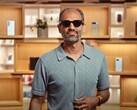The latest addition to TCL's RayNeo (or 'Thunderbird', as it is also known in China) series is touted as everything a pair of top-end smart glasses should be.
The device has been unleashed with 'lenses' based on up-to-date microLED technology developed by TCL in-house to generate a "full-color" AR interface clearly aimed at that of the Apple Vision Pro in terms of quality, immersion and usability.
The 'screen' visible through the glasses is touted to simulate the experience of using a comparable physical monitor as much as possible thanks to TCL's new waveguide.
The X3 Pro's output should also be impressively bright at a peak of 6,000 nits and 3,500 nits on average. The IP52-rated glasses are backed to be light enough for everyday use with a mass of just 76 grams (g), and to be kept on with a 245mAh battery that takes 40 minutes to charge.
Their 30° field of view is complemented by 3 degrees-of-freedom (3DOF) head-tracking, as opposed to 6DOF in some other headsets or glasses.
The X3 Pro is powered by Qualcomm's dedicated Snapdragon AR1 platform and has dual cameras made with sensors from Sony and OmniVision. The latter come in most handy for AI features such as virtual assistance, real-time translation and object recognition.
There are also triple microphones and dual speakers for the same purposes. The glasses apparently overcomes the potential problem of AR software fragmentation by using Android, and are thus rated to use apps such as Douyin and Bilibili.
That highlights one of the main drawbacks of the X3 Pro to date, which is that they have been released for use in China alone to date.
Their recommended retail price is 8,999 yuan (~$1,250), although that comes down to 7,649 yuan (~$1,063) with applicable subsidies.
There is no word of a global version of the X3 Pro as yet, although the RayNeo Air 2s OLED glasses can be bundled with their JoyDock Nintendo Switch adapter for $417 on Amazon right now.

























